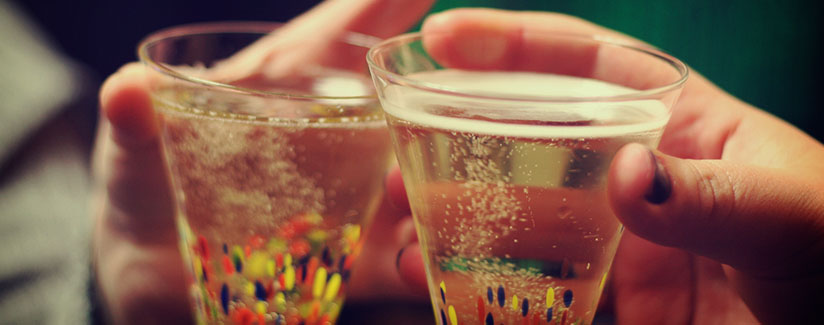
New Year’s Hangover? Let Us Help!
HAPPY NEW YEAR! Oh, sorry. Did we just say that too loudly? Feeling a little sensitive to sound and light? Perhaps feeling a little unpleasant in general? If you spent New Year”s Eve celebrating by imbibing on a few libations here and there, then you, my friend, are most likely suffering from a hangover.
But what exactly is a hangover? Characterized by various symptoms which may include drowsiness, dizziness, nausea, concentration problems and fatigue, the alcohol hangover develops after drinking when one’s blood alcohol concentration (BAC) returns to zero. There has been very little scientific research conducted on the topic of the alcohol hangover, what causes it, and what (if anything) cures it. According to Dr. Sean O’Keefe of Virginia Tech, there are a number of things that could be related, including the amount of alcohol consumed, the type of alcohol consumed, and even genetics. The lack of scientific study doesn’t stop various media outlets from listing their suggested “hangover cures.” To save you the trouble of Googling and reading through these various lists, we did it for you! Here are the top 10 most commonly-mentioned foods that may or may not get you back to full functionality after a night of imbibing.
- Eggs – The incredible, edible egg is apparently a great destroyer of toxins. Eggs are loaded with cysteine, an amino acid that helps break down toxins your body hasn’t done itself.
- Coconut water – Alcohol is dehydrating and an obvious hangover cure is hydration! Coconut water is said to contain just as many electrolytes as Gatorade and other sports drinks minus the sugar!
- Ginger – Ginger is said to stimulate the digestive system, helping to ease unpleasantries such as constipation, gas, bloating, indigestion, and even vomiting.
- Tomato juice – Your body struggles to maintain adequate blood sugar levels while you’re drinking and this is where tomato juice comes to the assist. Simple sugars found in tomato juice will help get your energy levels back up. Bonus – it’s full of vitamin C and it’s hydrating.
- Bananas – Alcohol’s dehydrating factor leads to low levels of potassium. Good news: Bananas are not only easy on the stomach but also full of potassium, low levels of which are linked to weak-feeling muscles – a common hangover symptom.
- Asparagus – These spears are packed with amino acids and antioxidants that can help stop a hangover – perhaps even before it starts.
- Coffee – The caffeine in coffee can help dilate blood vessels to help get rid of that headache you woke up with (and who wants a caffeine headache on top of a hangover headache?). Also, if you’re feeling a little on the slow side, caffeine can help perk up brain functions.
- Soup – The salt can help to retain lost water in your body. You might find that certain varieties also contain needed potassium. And soup is hydrating, right?
- Fruit juice – Or just fruit in general. Fruit contains fructose, which helps to naturally boost energy. Fruits also contain many nutrients and vitamins that your body may need to restore due to alcohol’s diuretic effects.
- Sports drinks – Sports drinks are usually not recommended unless you’re engaging in intense physical activity but a night out celebrating a new year counts, right? These beverages are full of electrolytes to help hydrate. Just beware of the high sugar count.
- BONUS – Hangovers can be prevented by not consuming alcohol, but if you must, just remember – moderation is key. The recommended alcohol intake for healthy adults is one drink a day for women of all ages and men older than age 65 and two drinks a day for men age 65 and younger.
While this quick Google search provided some insight we didn’t have before, we also wanted to consult an expert. Here’s what registered dietitian Carolyn O’Neil, MS, RD, recommends to nurse your holiday hangover:
“The most common symptoms including headache, tiredness, dizziness, and irritability are caused primarily by dehydration. The best way to rehydrate – as with rehydrating after physical exertion playing sports or mowing the lawn on a hot day – is with electrolyte-containing sports drinks. The mix of water, sugar and salts helps the body rehydrate and recover more quickly. Low-fat chocolate milk is a good option too because it provides needed fluid, protein, sugar and the electrolyte minerals sodium and potassium. Eat light foods such as toast, broth-based soups and fruit. Avoid high-fat foods because they can contribute to nausea. That greasy burger won’t help your hangover.”
Dr. O’Keefe recommends that you drink water with your alcoholic drinks to slow down consumption and to try to track your BAC, which can be done using a smart phone app. He also adds:
“The best way to treat a hangover is to not get one. Drink one water for each alcoholic drink, eat before drinking (slows alcohol absorption), watch the alcohol content of your drinks (mixed spirit drinks are difficult to estimate standard drinks of alcohol, something that is key to knowing how much you are consuming.”
Disclaimer: None of the foods listed above are scientifically proven to “cure” hangovers, BUT home studies by a few team members will back some of these claims.
“Happy 2009!” by Ginny is licensed under CC BY SA.



























